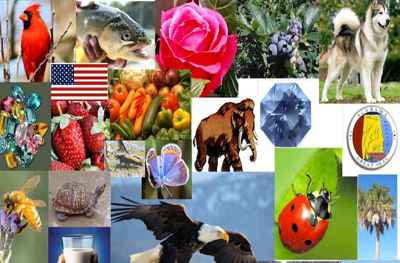
Montana Symbols
Montana State Grass
Bluebunch Wheatgrass

(Agropyron spicatum (pursh))
Adopted in 1973.
Bluebunch Wheatgrass, (Agropyron spicatum,) was adopted in 1973 as Montana's State Grass..
Bluebunch is found all over the state and all through the West. It can be found mostly in flat areas and below mountains. It's important to cattle and sheep ranchers as food for their animals.
See Montana and Washington
Montana State Grass: Bluebunch Wheatgrass

Alone, bluebunch wheatgrass represents all Montana. Of all the state's native symbols, it enjoys the widest range. The honor of becoming Montana's state grass was bestowed upon it by the forty-third Legislature in 1973.
The state grass greens up early throughout Montana, grows in most soils, and protrudes above the early snows of fall to provide excellent forage for livestock. Such range-fed cattle and sheep contribute significantly to Montana's economy, which averages over 700 million dollars in gross revenues in recent years.
Perhaps no one is more aware of the attributes of bluebunch wheatgrass than ranchers in the northern and eastern parts of the state. It was from that section of the state - Havre, to be specific - that a movement began to recognize the grass.
A community development group in Havre called FORUM, sponsored jointly by the area Chamber of Commerce and Hill Country Extension Service, began a drive to have the state designate an official grass in the spring of 1972. Under the able leadership of Mrs. Toni Hagener, FORUM elicited support from all quarters. Sponsors included the state's press and USDA Range Conservationist Joseph C. Zacek.
FORUM's efforts reached fruition in Senator David James' Senate Bill 41, during the 1973 session. Agropyron spicatum, Bluebunch Wheatgrass in scientific terms, became Montana's official state grass and joined the list of symbols to represent a state notable for contrasts in heritage and physical endowment.
Special Acknowledgements to: Montana Historical Society, Rex C. Meyers and Norma B. Ashby
Common Name(s):
Bluebunch Wheatgrass
Scientific Name:
Pseudoroegneria spicata (Pursh.) A. Löve
Scientific Name Synonyms:
Agropyron spicatum (Pursh.) Scribn. & J.G. Sm.
Symbol:
PSSP6
Description: of Bluebunch wheatgrass
Life Span: Perennial
Origin:Native
Season: Cool
Growth Characteristics: Erect bunchgrass, 1 to 2 ½ feet tall, often with short rhizomes. Growth begins in April, and the plants stay green well
into the summer. Regrowth occurs following fall rains. Reproduces from seeds, tillers, and rarely by rhizomes.
Seedhead:Slender spike up to 6 inches long; spikelets not imbricate to 1/8 imbricate, containing 4 to 8 florets; glumes acute; Bluebunch wheatgrass
lemmas have awns 3/8 to ¾ inches long, divergent at maturity. It can also be awnless.
Leaves: Numerous, rolled in bud; blades flat or loosely rolled; glabrous or pubescent above, commonly 1/16 inch wide, tapering to the tip. Sheaths
glabrous; ligules short, collar shaped, membranous; auricles small.
Ecological Adaptations:
Bluebunch wheatgrass has a wide spectrum of adaptations at elevations between 4,000 and 9,000 feet. It is found on all aspects on mountain slopes,
benches, basins, or alluvial fans, and in valley bottoms. Bluebunch wheatgrass is one of the more widely distributed and useful species in Utah.
Soils: Adapted to a wide variety of soils, but is found mostly in well-drained, medium to coarse textures soils which vary in depth from shallow
to very deep. It is found only in small quantities on fine-textured soils. It will tolerate moist soils, but is most abundant on dry soils.
Associated Species: Big sagebrush, Nevada bluegrass, Idaho fescue, sandberg bluegrass, and Douglas rabbitbrush.
Uses and Management:
The forage value of Bluebunch wheatgrass is excellent for cattle and horse, good for sheep, elk, and deer. It cures well and makes good standing
winter feed. Season long, continuous grazing should be avoided. Research has found it can withstand early heavy use if it is used in a rotational grazing
system.
An abundance of bluebunch wheatgrass is an indicator of well managed rangelands.
Montana Law
The law designating the grass known as bluebunch wheatgrass, as the official Montana state grass is found in the Montana Revised Statutes, Title 1, Chapter 1, Part 5, Section 1-1-506
TITLE 1. GENERAL LAWS AND DEFINITIONS
CHAPTER 1. GENERAL PROVISIONS
Part 5. State Symbols - Official Designations
1-1-506. State grass. The grass known as bluebunch wheatgrass, Agropyron spicatum (pursh), shall be designated and declared to be the official grass
of the state of Montana.
History: En. 19-124 by Sec. 1, Ch. 378, L. 1973; R.C.M. 1947, 19-124.
Taxonomic Hierarchy: Bluebunch Wheatgrass
Kingdom: Plantae - Plants
Subkingdom: Tracheobionta - Vascular plants
Superdivision: Spermatophyta - Seed plants
Division: Magnoliophyta - Flowering plants
Class: Liliopsida - Monocotyledons
Subclass: Commelinidae
Order: Cyperales
Family: Poaceae ⁄ Gramineae - Grass family
Genus: Pseudoroegneria (Nevski) A. Love - wheatgrass
Species: Pseudoroegneria spicata (Pursh) A. Love - bluebunch wheatgrass







